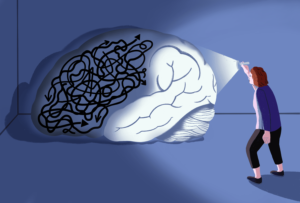Attention Deficit Hyperactivity Disorder (ADHD) is a neurodevelopmental disorder that affects millions of people worldwide. It can significantly impact one’s daily life, including relationships, academic or professional performance, and overall well-being. Fortunately, there are dedicated professionals known as ADHD psychologists who specialize in diagnosing and treating ADHD. In this blog, we’ll explore the role of an ADHD psychologist, the benefits of seeking their help, and how to find an ADHD psychologist near you.
Contents
Understanding ADHD
Understanding ADHD (Attention Deficit Hyperactivity Disorder) is essential for individuals, families, educators, and healthcare professionals to provide effective support and interventions for those affected by this neurodevelopmental disorder.
ADHD is a neurodevelopmental disorder that primarily affects children but can persist into adolescence and adulthood. It is characterized by persistent patterns of inattention, hyperactivity, and impulsivity that interfere with daily functioning and development. ADHD is a highly prevalent condition, affecting millions of individuals worldwide.
The Role of an ADHD Psychologist

These professionals specialize in understanding the complexities of ADHD and play a significant role in helping individuals and their families manage the challenges associated with this neurodevelopmental disorder. Here’s a detailed look at the role of an ADHD psychologist:
- Assessment and Diagnosis: One of the primary roles of an ADHD psychologist is to assess and diagnose ADHD accurately. This involves conducting comprehensive evaluations to determine if an individual meets the criteria for ADHD. The assessment process often includes:
- Clinical Interviews: The psychologist conducts interviews with the individual and, when applicable, their parents or caregivers, to gather information about the individual’s symptoms, history, and daily functioning.
- Behavioral Observations: The psychologist may observe the individual in various settings, such as school or home, to assess their behavior and how ADHD symptoms impact their daily life.
- Questionnaires and Rating Scales: Standardized questionnaires and rating scales are used to gather information from multiple sources, including teachers and family members, to assess the presence and severity of ADHD symptoms.
- Treatment Planning: Once a diagnosis is confirmed, the ADHD psychologist works closely with the individual and their family to develop a personalized treatment plan. This plan may include a combination of the following:
- Behavioral Interventions: ADHD psychologists often employ behavioral therapy techniques to help individuals develop essential skills for managing their symptoms. These strategies may include improving focus, organization, time management, and impulse control.
- Psychoeducation: Educating individuals and their families about ADHD is a crucial aspect of the psychologist’s role. Understanding the condition, its impact, and available treatments can help reduce stigma and improve coping strategies.
- Emotional Support: Living with ADHD can be challenging, and individuals may experience frustration, anxiety, and low self-esteem. ADHD psychologists provide emotional support and teach strategies for managing these emotions.
- Medication Management: While psychologists cannot prescribe medication, they can collaborate with psychiatrists or medical doctors who can. Medication can be an effective component of ADHD treatment for some individuals, and the psychologist helps monitor its effectiveness.
- Skill Development: ADHD psychologists work on skill development with individuals, focusing on areas where they may struggle due to their ADHD symptoms. This can include improving executive functioning skills like planning, organization, and self-regulation.
- Family and School Support: ADHD psychologists often work with families to help them understand and support their loved ones with ADHD. They may guide parents on effective parenting strategies and collaborate with schools to create Individualized Education Plans (IEPs) or 504 plans tailored to the individual’s needs.
Benefits of Consulting an ADHD Psychologist
Here are some key benefits of consulting an ADHD psychologist:
- Accurate Diagnosis: ADHD is a complex condition with overlapping symptoms that can be mistaken for other issues such as anxiety or learning disabilities. ADHD psychologists are trained to conduct comprehensive assessments and differentiate ADHD from other conditions, leading to a more accurate diagnosis.
- Personalized Treatment Plans: After diagnosis, ADHD psychologists work with individuals and their families to create personalized treatment plans tailored to their specific needs and challenges. These plans may include a combination of therapy, behavioral interventions, and, if necessary, medication.
- Coping Strategies: Living with ADHD can be challenging, and individuals often face frustration, anxiety, and low self-esteem. ADHD psychologists provide emotional support and teach coping strategies to help individuals manage these emotions effectively.
- Improved Quality of Life: With the right treatment and support, individuals with ADHD can lead more fulfilling lives. They can experience improved academic or work performance, better relationships, and greater overall well-being.
- Medication Management: While psychologists cannot prescribe medication, they can collaborate with psychiatrists or medical doctors who can. Medication can be an effective component of ADHD treatment for some individuals, and the psychologist helps monitor its effectiveness and side effects.
- Improved Self-Esteem: ADHD can sometimes lead to feelings of inadequacy or low self-esteem due to difficulties in school or work. Psychologists work on building self-confidence and self-awareness, helping individuals recognize their strengths and talents.
Finding an ADHD Psychologist Near You

Finding an ADHD psychologist near you is a crucial step in accessing specialized care for Attention Deficit Hyperactivity Disorder (ADHD). Here are steps to help you find an ADHD psychologist in your locality:
- Ask for Recommendations: Start by asking your primary care physician or pediatrician for recommendations. They often have a network of healthcare professionals and may know of reputable ADHD psychologists in your area.
- Contact Your Insurance Provider: If you have health insurance, reach out to your insurance provider to inquire about in-network ADHD psychologists. This can help you find a psychologist who accepts your insurance, making treatment more affordable.
- Contact Local Mental Health Organizations: Reach out to local mental health organizations or advocacy groups focused on ADHD. They may have a list of recommended professionals in your area. These organizations can also offer valuable information and support.
- Seek Recommendations from Schools and Educational Specialists: If you are looking for an ADHD psychologist for a child, consider contacting your child’s school or educational specialists. They may be able to provide referrals to psychologists who specialize in working with children and adolescents with ADHD.
- Consult Online Teletherapy Platforms: If you cannot find a suitable ADHD psychologist in your immediate vicinity, consider exploring online teletherapy options. Many qualified psychologists offer remote counseling services, allowing you to access specialized care from the comfort of your home.
- Ask for Referrals from Support Groups: Consider joining local or online ADHD support groups. Members of these groups often share their experiences and can provide recommendations for ADHD psychologists they have worked with.
Initial Consultation by ADHD Psychologist
The initial consultation with an ADHD psychologist is a crucial first step in the process of seeking assessment, diagnosis, and treatment for Attention Deficit Hyperactivity Disorder (ADHD). This meeting serves several purposes, both for the psychologist and for you or your loved one seeking help. Here’s what you can expect during an initial consultation with an ADHD psychologist:
1. In-Person or Telehealth Meeting:
- The initial consultation can take place in person at the psychologist’s office or through telehealth (video conferencing). Telehealth options have become increasingly common and can be convenient, especially if distance or scheduling conflicts are a concern.
2. Introduction and Building Rapport:
- The psychologist will start the consultation by introducing themselves and creating a welcoming and non-judgmental environment. Building rapport is crucial, as it helps individuals feel more comfortable discussing their concerns.
Conclusion
In conclusion, seeking the assistance of an ADHD psychologist can make a significant difference in the lives of individuals with ADHD. These professionals provide specialized guidance, personalized treatment plans, and valuable support to help individuals manage their symptoms effectively. Don’t hesitate to reach out and explore the options available to you or your loved ones.
A psychologist is a professional who specializes in the study of human behavior and mental processes. If you have any queries regarding online therapy experienced therapists at TherapyMantra can help: Book a trial Online therapy session.


